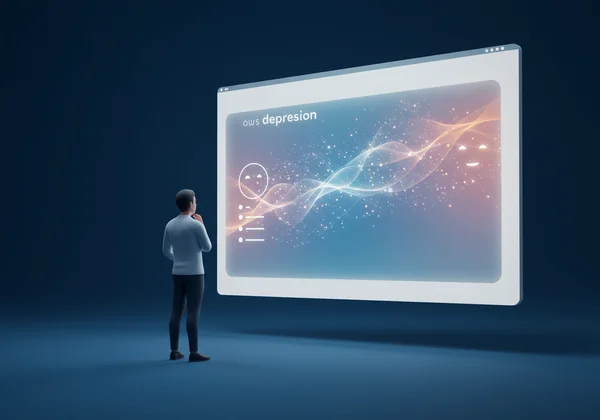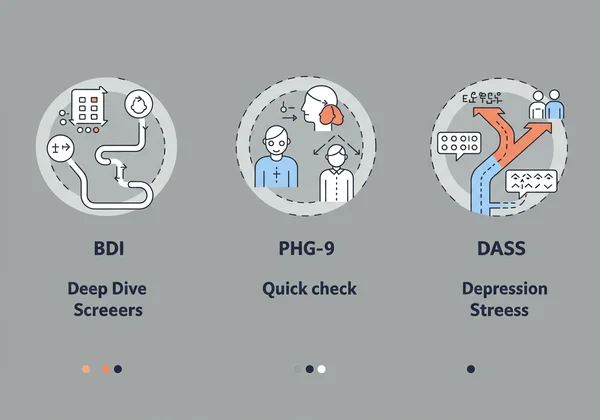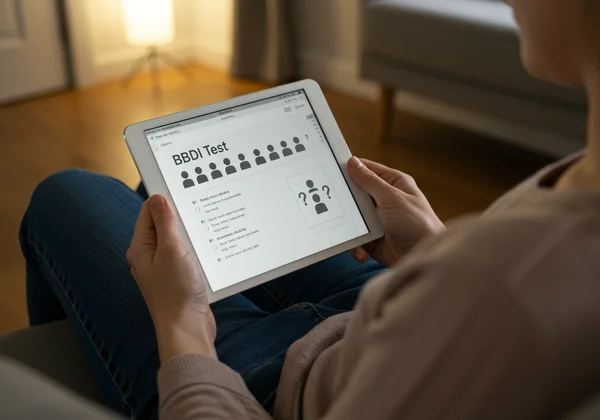BDI Test vs. PHQ-9 vs. DASS: Choosing a Depression Test
August 17, 2025 | By Beatrice Holloway
Feeling overwhelmed by the alphabet soup of mood self-assessment options? You're not alone. When you're seeking clarity about your mental state, trying to choose between acronyms like BDI, PHQ-9, and DASS can be confusing. Which screener is for you? This guide, from the perspective of an experienced online tool reviewer, provides a clear, side-by-side comparison to help you confidently select the right screening tool for your unique needs. We'll break down the purpose, strengths, and ideal use case for each, empowering you to take a meaningful first step in understanding your emotional well-being.
What are Depression Screening Tools?
Before we dive into the specifics of BDI vs PHQ-9, it's important to understand what these tools are—and what they are not. Depression screening tools are structured questionnaires designed to identify the presence and severity of depressive symptoms. They are not a crystal ball, but rather a structured mirror, reflecting patterns in your thoughts, feelings, and behaviors over a specific period. They provide a valuable, objective starting point for self-reflection and can be a crucial first step toward seeking professional help. The goal is to move from a vague feeling of "not being okay" to having a clearer picture of what you're experiencing.
Why Use a Self-Assessment Screener?
In our review of mental wellness tools, we find that users are drawn to self-assessment screeners for several key reasons. First is privacy and convenience; you can take them anytime, anywhere, without immediate pressure. Second, they foster self-awareness. Answering specific questions can help you connect the dots between your mood and specific life challenges. Finally, the results, like a BDI score meaning, can provide a concrete starting point for a more productive conversation with a doctor or therapist, should you choose to take that step.
Screening vs. Diagnosis: A Crucial Distinction
This is the most critical point to understand: a screening tool is not a diagnostic tool. No online test can diagnose clinical depression. A diagnosis can only be made by a qualified healthcare professional who considers your full history and context. Think of a screener like a home thermometer; it can tell you if you have a fever (a symptom), but it can't tell you if you have the flu or a bacterial infection (the diagnosis). These tests provide preliminary insight, not a final verdict. The results from a BDI depression test are meant to be an informational guide for your personal journey.

Head-to-Head: BDI vs. PHQ-9 vs. DASS
Let's put these three popular screeners under the microscope. Each has a different focus and design, making them suitable for different purposes. Understanding their unique characteristics is key to making an informed choice.
The Beck Depression Inventory (BDI-II)
The Beck Depression Inventory, particularly its second edition (BDI-II), is one of the most respected and widely used instruments for measuring the severity of depression. Developed by Dr. Aaron T. Beck, a pioneer of cognitive therapy, it consists of 21 questions. Its strength lies in its comprehensive nature, assessing the cognitive (e.g., pessimism, self-criticism), affective (e.g., sadness, loss of pleasure), and somatic (e.g., fatigue, changes in sleep) symptoms of depression. This BDI test provides a detailed, nuanced snapshot of your emotional landscape.
The Patient Health Questionnaire (PHQ-9)
The PHQ-9 is a much shorter, nine-question tool that has become a staple in primary care settings. Its main advantage is its brevity and direct alignment with the diagnostic criteria for major depressive disorder as outlined in the DSM-5 (the standard classification manual for mental disorders). Each of the nine questions corresponds to one of the nine DSM-5 criteria. It’s a quick, efficient tool for detecting and monitoring depression, often used by general practitioners to decide if a referral to a mental health specialist is needed.
The Depression, Anxiety and Stress Scale (DASS-21)
As its name suggests, the DASS-21 is different because it isn't solely a DASS test for depression. It is designed to differentiate between three distinct emotional states: depression, anxiety, and stress. It consists of 21 questions, with seven questions dedicated to each of the three scales. This tool is particularly useful when your feelings are tangled and you're unsure if what you're experiencing is primarily depression, a form of anxiety, or a response to chronic stress. It helps untangle these often-overlapping experiences.
Comparison Table: Key Differences at a Glance
To make things even clearer, here’s a breakdown of how these tools compare:
| Feature | BDI-II (Beck Depression Inventory) | PHQ-9 (Patient Health Questionnaire) | DASS-21 |
|---|---|---|---|
| Number of Questions | 21 | 9 | 21 |
| Primary Focus | Deeply measures the severity of a wide range of depressive symptoms. | Quickly screens for depression based on DSM-5 diagnostic criteria. | Differentiates between depression, anxiety, and stress symptoms. |
| Time to Complete | 5-10 minutes | 1-3 minutes | 3-5 minutes |
| Best For... | In-depth self-exploration and a nuanced understanding of your depressive symptoms. An excellent first step for personal insight. | A rapid check-in, often in a clinical setting, or for tracking symptom changes over time. | Individuals who are unsure if their feelings stem from depression, anxiety, stress, or a combination. |

How to Choose the Right Depression Test For You
Now that you understand the differences, how do you choose the depression test that's right for your situation? The answer depends entirely on your goal. There is no single "best" test—only the best test for your specific question.
Choose the BDI for a Deep Dive into Depressive Symptoms
If your goal is to gain a richer, more detailed understanding of your own emotional state, the BDI test is an unparalleled choice. It doesn't just ask if you're sad; it explores feelings of guilt, self-dislike, irritability, and changes in your physical well-being. This depth makes it an excellent tool for self-reflection. If you're looking to start a journey of self-discovery and want comprehensive insights, the BDI is the place to begin. You can take our confidential test to get a detailed perspective on your mood.
Choose the PHQ-9 for a Quick, Clinically-Aligned Check-in
If you're short on time or if your doctor has asked you to monitor your symptoms, the PHQ-9 is a highly practical option. Its speed and direct link to clinical criteria make it an efficient and reliable screener. It’s perfect for periodic check-ins to see if your symptoms are improving, worsening, or staying the same over time. While you can find it online, it is most powerful when used in consultation with a healthcare provider.
Choose the DASS When Your Feelings are Tangled
If you find yourself thinking, "I feel awful, but I don't know why," the DASS-21 can be incredibly illuminating. It helps you see if your distress is characterized more by the hopelessness of depression, the physiological arousal of anxiety, or the nervous tension of stress. This can be a vital clue in figuring out the best coping strategies or the right kind of professional support to seek.
Your First Step to Clarity
Ultimately, choosing a screener isn't about finding a "winner"—it's about finding the right tool for your personal journey. While the PHQ-9 offers a quick snapshot and the DASS helps untangle complex feelings, the BDI provides an unmatched, in-depth look into your emotional world.
If you are ready to move beyond uncertainty and take a meaningful first step toward self-understanding, the BDI test is your most powerful ally. It provides the detailed, scientifically-backed insight you need to understand not just that you're struggling, but how.

Ready to find your clarity? Take our free, confidential BDI test now and begin your journey. Take our free BDI test now.**
Your Questions on Depression Screeners Answered
What is the main difference between the BDI and PHQ-9?
The main difference lies in depth versus speed. The BDI-II (21 questions) provides a deep, nuanced exploration of cognitive and physical symptoms of depression, making it ideal for self-understanding. The PHQ-9 (9 questions) is a rapid screener that aligns directly with clinical diagnostic criteria, making it efficient for quick check-ins and use in primary care.
Is the BDI test scientifically valid and reliable?
Yes. The Beck Depression Inventory is one of the most well-established and researched psychological assessments in the world. Its validity (it measures what it claims to measure) and reliability (it produces consistent results) have been confirmed by decades of research, making it a gold standard for depression screening. Our free bdi test is based on this proven methodology.
Can these tests tell me if I have one of the five levels of depression?
These tests provide a score that corresponds to different levels of symptom severity, such as minimal, mild, moderate, or severe depression. For instance, the BDI has clear score ranges that help you interpret BDI-II scores. However, these levels are part of a screening and are not a formal diagnosis of a specific depressive disorder. They are a valuable guide to help you and a healthcare professional understand the intensity of your symptoms.